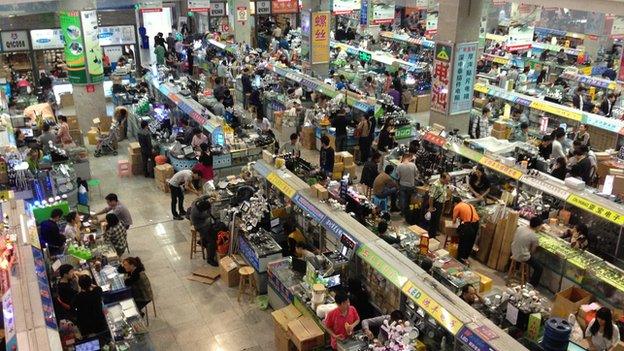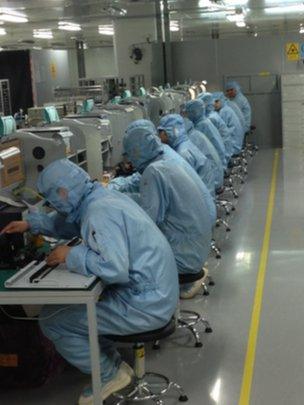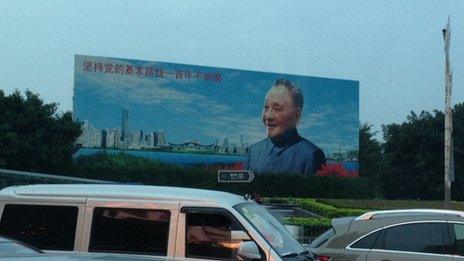China diary: Electronics Street
- Published
- comments

It's home to the world's largest factories where many of today's most popular gadgets are made. But Shenzhen is also a great place to buy those same products - if, that is, you can cope with the noise, the hustle, the sheer naked capitalism of Hua Qiang Bei Electronics Street.
This is a wide thoroughfare right in the middle of this ever-expanding metropolis packed with shops and supermarkets selling consumer electronics, from the latest smartphones to smart televisions, from laptops to tablet computers. For a Londoner it is like Tottenham Court Road on steroids with 10 times the noise and a hundred times the hard sell.
For a newcomer to China, it is also a reminder of how rapidly this country has grown, and how much disposable income at least some people have. You can buy an extraordinary variety of mobile phones here, including many brands that will be unfamiliar outside China.
But everywhere two names, Apple and Samsung, leaped out from the neon signs. One business owner told me that these were the brands to which everyone aspired - "five years ago it was Nokia" - despite the fact that you can pay around £600 for an iPhone or a Samsung Galaxy S3.
Earlier I'd visited a middle-aged analyst at a think tank who explained that his generation had sought out cheaper brands but teenagers saw things very differently. "Give my daughter a copycat phone," he said, "and she'll throw it back at you and demand the real thing." Whipping out his own iPhone, he then told me with some pride that the inscription "made in China, designed in California" was not entirely accurate. He claimed that industrial designers at Foxconn had come up with four possible designs for the latest phone, and then Apple had chosen one.
What confused us on Electronics Street was whether all the shops selling well-known brands were entirely legitimate. We went into one store with an Apple logo and staff all wearing the same blue polo-shirts and had a look at the products. The store was advertising the iPhone 5 - not yet officially on sale in China - and had a dummy model with the kind of fake screen you see on cheaper phones in UK stores.

An iPad on display looked somehow subtly different from the real thing, and when we tried to film the outside of the store the manager came onto the pavement and put his hand over the lens. In some parts of the world Apple is fiercely protective of its intellectual property, but it may have decided that closing down all of Shenzhen's "Apple Stores" - apart from the one genuine outlet - is just too much bother.
A cavernous building filled with tiny stalls selling every imaginable electronic component may offer a more genuine experience - as long as you are prepared to bargain. Anyone expert enough - and sufficiently skilled at haggling - could emerge with the parts needed to build a computer for very little. I'm hopeless at that, so managed to pay about the same for a micro SD card as I would at home.
Earlier in the day we'd travelled north from Shenzhen to Songshan Lake, passing through the last scraps of farmland left in a region where farmers are becoming rich by selling up to industrial developers.
Our destination was a Huawei plant making highly sophisticated telecoms equipment, managed by a Hungarian engineer called Gabor Schreck. He told us that this factory was another symbol of the new China, importing foreign skills like his. Japan's Toyota and America's IBM had already helped the business transform its production processes, but continuous improvement would be needed.
"China is no longer cheap," he emphasised, and pointed to the call from the outgoing President Hu Jin Tao for per capita wages to double by 2020. As it struggles to combine rapid growth with social cohesion, the country needs its factories to keep on improving their productivity.
Back in Electronics Street, as we filmed the teeming masses shopping for gadgets, a young woman carrying an Apple iMac computer came past with a determined look, apparently trying to remember just where she'd bought it. China's consumers are getting more affluent and more demanding.

Then as we drove away, we were reminded of how Shenzhen and this consumer revolution got started. At a traffic choked intersection stood a large poster of Deng Xiao Ping, the man who opened up China's economy. He came here in 1992 to see how things were going and pronounced that his policy of socialism combined with the free market should continue for a hundred years.
Twenty years on the market part of that policy seems to be going rather well. The trick now will be to go on satisfying the desires of China's growing army of middle class consumers while maintaining the country's competitive edge.